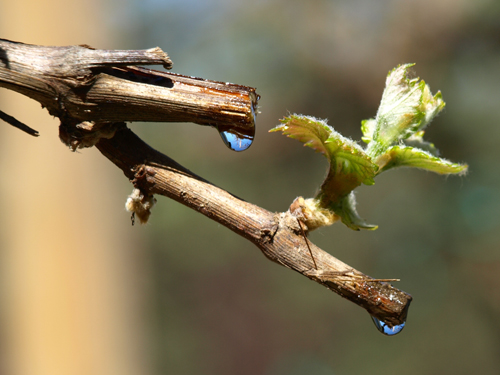
by Levan Sefiskveradze
Since there is no established system of crop insurance policies in Georgia, most of the country’s wine producing regions often lose a whole year’s harvest to natural disasters. While Kakhetian winemakers are still threatened by hail and torrential rain storms in the area, Guria, another wine producing region, has been hit by the spring frost this year resulting in the massive crop losses.
2014 has been extremely tough for Guria. A three-day frost in late March has had devastating effects on all of the three wine producing zones of the area. Yet, Chokhatauri has been hit hardest among them causing not only a massive damage of the buds of grapevines and other fruit plants, but also the distruction of vines themselves. As a result, the frost has drastically reduced the current year’s crop yield.
It is worth noting that selling grapes and wine is one of the primary sources of income for Chokhatauri population. Chkhaveri grape prices have been rising year after year and many local families are dependent on the profits from grape sales.
Another issue Guria winemakers are concerned about is the lack of government’s interest in the region’s viticulture and the absence of the subsidies, unlike the Kakheti region, where farmers are given compensations for the losses related to natural disasters.
Zura Topuridze, a vigneron and the owner of the “Iberieli” organization: ‘My family cellar owns vineyards in Chokhatauri region as well as purchases grapes from other villages of the region. I can say that the damage has had a double effect on my circumstances since the frost has hit hard not only my own vineyards, but also those of my neughbours from whom I buy the grapes. The weather was quite warm a few days before the frost, causing 95% of the grape buds of my vineyards in the village of Bukistsikhe to form and grow. Unfortunately, they have all been affected and mostly destroyed by the frost.’
Mr. Topuridze doubts his cellary will be able to produce Chxaveri wine this year since the frost has badly damaged the crops in the whole region. ‘The amount of yeild that I usually receive from my Bukistsikhe vineyard of approximately 200 vine plants, located in front of my house in the Sakvavistke neighbourhood, totals 500-600kg. Yet, this year’s expected crop is less than 50kg. As to the new grapevines, they all have been covered by the snow which will hopefully improve their chance of survival.’
The locals of Chokhatauri wine producing villages make a living primarily by selling grapes and wine. Almost every winemaker family of the region sells Tsolikouri varietal, which is the primary source of their income along with another varietal of the area, Chkhavery that costs 4-5 GEL per kilogram. The frost damage, however, left them without this main source of income. The locals expect to receive only 10% of their average annual return. The situation is quite similar in the Ozurgeti region as well.
David Kobidze, a winegrower of the village Erketi, Municipality of the Chokhatauri Region: ‘The vines of the Chokhatauri region including those in our village were badly hit by the frost damaging almost all of the vineyards. These are the vineyards of Tsolikauri, Aladasturi, Adessa, Chkhaveri and of other local varietals. The frost hit 99% of the vine buds hard and not only that, it is hard to say whether the vines themselves have survived from the frost.
My old vineyards hold one third of a hectare from which I usually receive a Chkhaveri crop yield of about two tonnes. In addition to this, the vineyards produce a ton of Tsolikauri and about the same amount of Adesa grape varieties. However, this year, I believe, I’ll end up losing 6 to 8 thousand GEL due to the frost, which is a financial crisis for my family.
The financial well-being of Erketi population depends primarily on the amount of grape sales since there is not an enough land to grow nut trees, for instance. Thus, 90% of the village population have been experiencing a considerable financial hardships due to the crop losses. The population of the Guria region, including the village of Erketi, demands from the government and from all the officials in charge, that they are given at least some amount of compensation. Otherwise, the region will suffer a serious crisis leaving a large number of people without any financial resource.
Hopefully, after reading the artice, they’ll be willing to show support and pay attention to our region which has long been abandoned by them. It has become significantly difficult for us to make our voices heard by the central government of Tbilisi.’
The winegrowers and farmers of the Guria region say they have never witnessed such an extreme cold weather during this time of the year. Even the elderly people of the Chokhatauri region cannot think of a single occasion of a late spring frost damaging all of the grapevine and fruit plant crops together.
Nugzar Sikharulidze, a winegrower of the village Bukistsikhe, Municipality of the Chokhatauri Region: ‘It is extremely hard for me to talk about the condition of our vineyards. The frost almost fully destroyed the vines leaving us with only hope that they will produce at least some secondary buds. Even in this case, it’s unlikely that they will produce shoots, but the leaves themselves might grow.
Ironically, the weather in Guria was really nice before the frost causing the vine buds and shoots to burst and grow, some of them to the extent of 10-15 centimeters. I have been growing almost every West Georgian grape variety in my vineyards: Tsholikouri, Chkhaveri, Imeruli Mtsvane, TsiTska, Jani, Skhilatubani and Ojaleshi. The majority of these varietals have been newly planted. They gave their first crop of grapes last year. I was expecting heavier yield in 2014. Unfortunately, the frost has caused such a widespread damage to the vineyards that there is little chance that they will produce at all this year.
The prices of Chkhaveri as well as those of other West Georgian varietals have risen recently and many of the locals have started to earn a living only as winegrowers. Therefore, we hope that the government will give us subsidies in order to compensate, at least partially, the outcomes of this disastrous vintage.
I have devoted my life to these vineyards. I’ve met a lot of people involved in this business through Zura Topuridze, who have helped me find and get hold of old grape varieties. Unfortunately, the rain, snow and frost have had destructive effects on my hard work of ten years. We tried everything to help the vines survive. We’ve even burnt tires in the vineyards to defrost the vines affected by the weather, however, nothing has worked. I only wish we had known about the upcoming frost in advance so that we could put fire in the vineyards right before the frost and watch over them night and day.’
Clearly, the situation in Guria is extremely tough. What’s most disappointing is that all this happened after the revival of the region’s viticulture while Chkhaveri varietal was also building its reputation and gaining popularity in and outside of the country.
The growers of Guria are asking for help and support from the government during these hard times. Hopefully, the current year’s frost and its consequences, including an expected low yield, won’t hinder the development of the viticulture in Chokhatauri. It’s always a good idea to keep positive attitude and to hope for the best.
Indeed, Georgian wine lovers will be given the opportunity to taste some of the interesting wine selections of Chkhaveri varietal from 2013 at the New Wine Festival, on May 24, 2014. How is it going to unfold next year? For now, it is hard to predict.
Translated by Tea Kokhreidze
© Georgian Wine Club/vinoge.com






